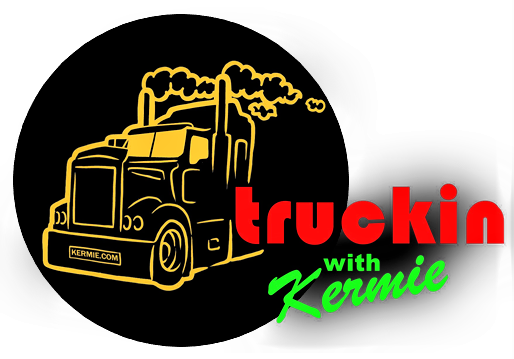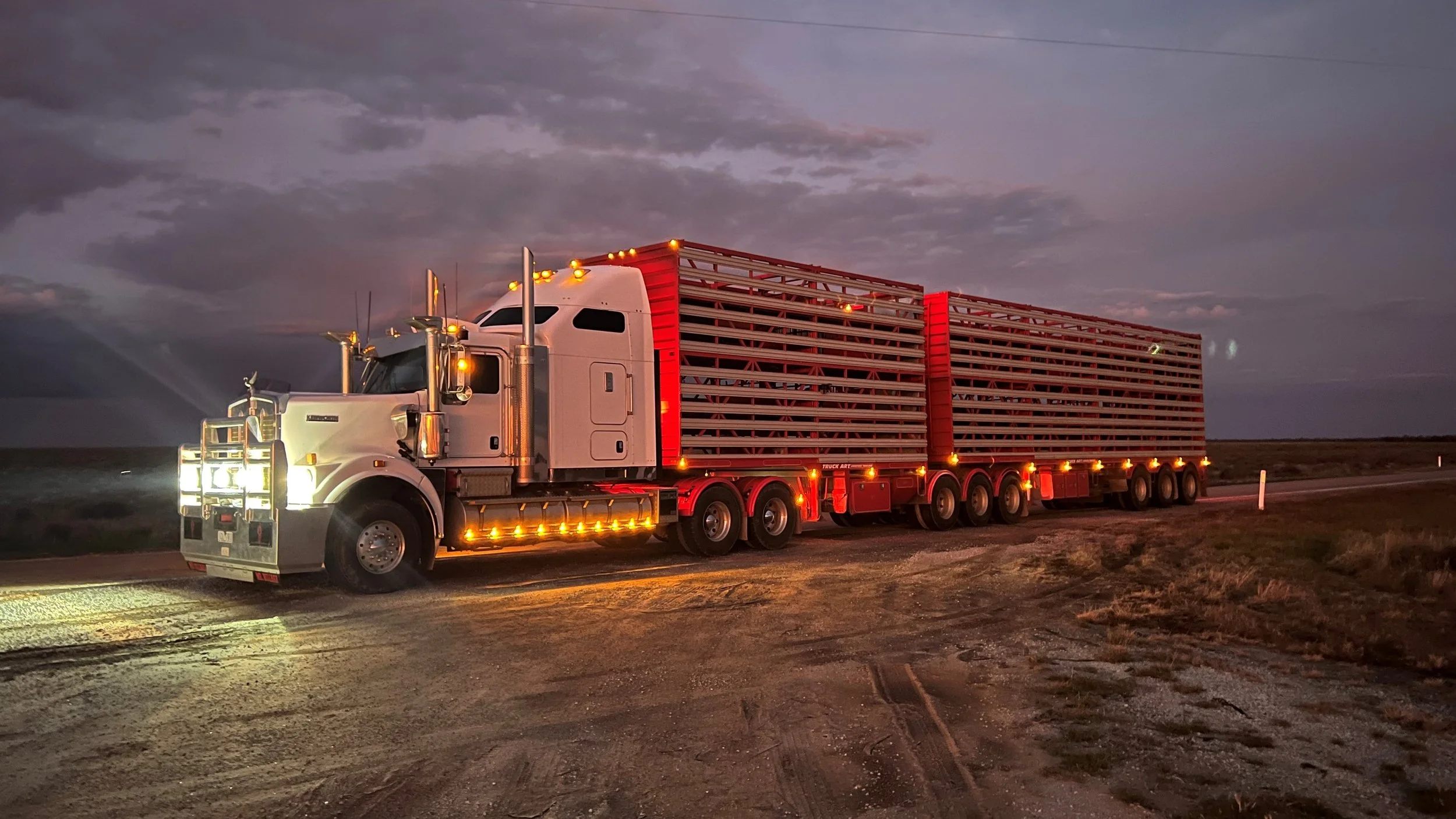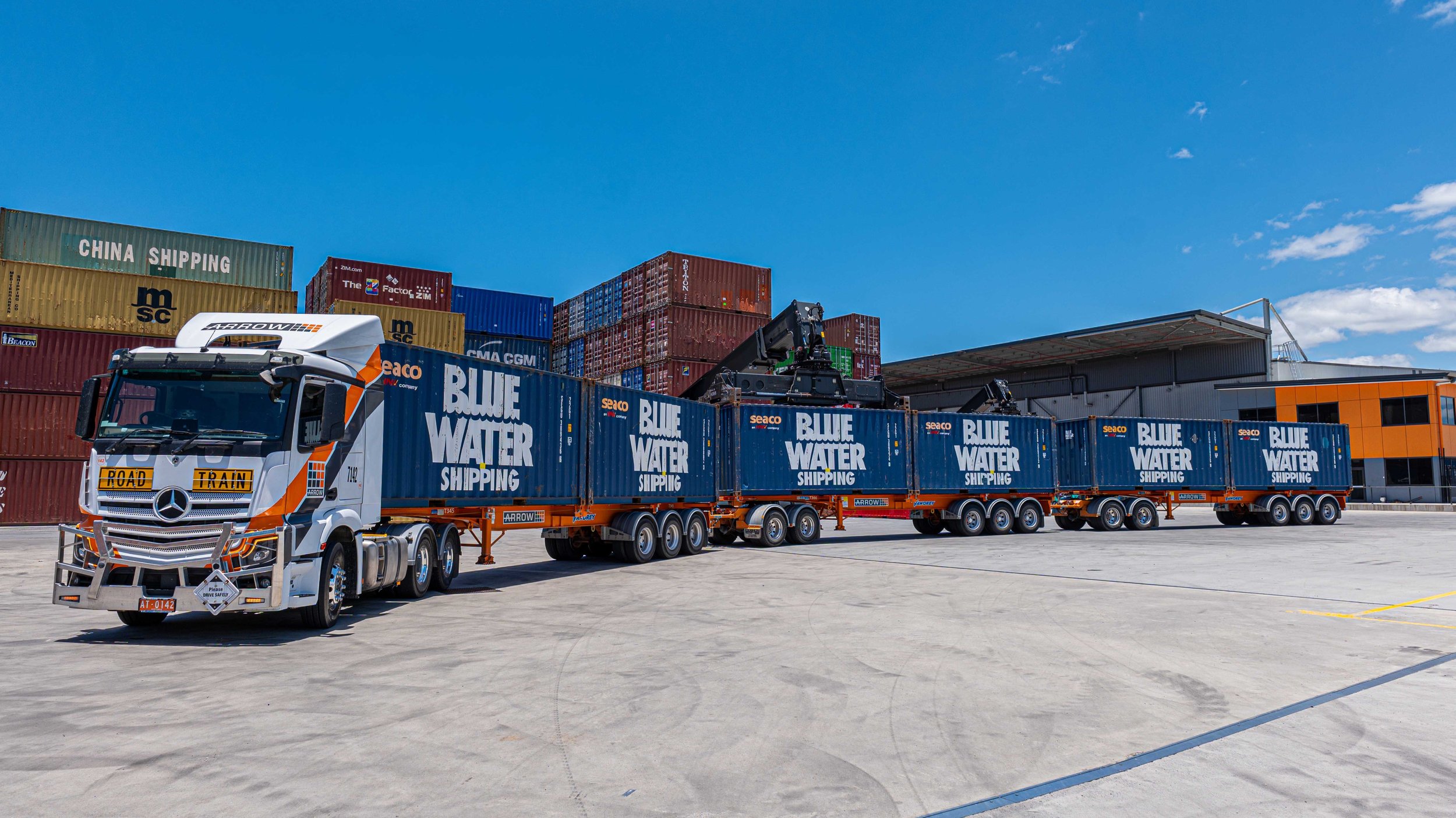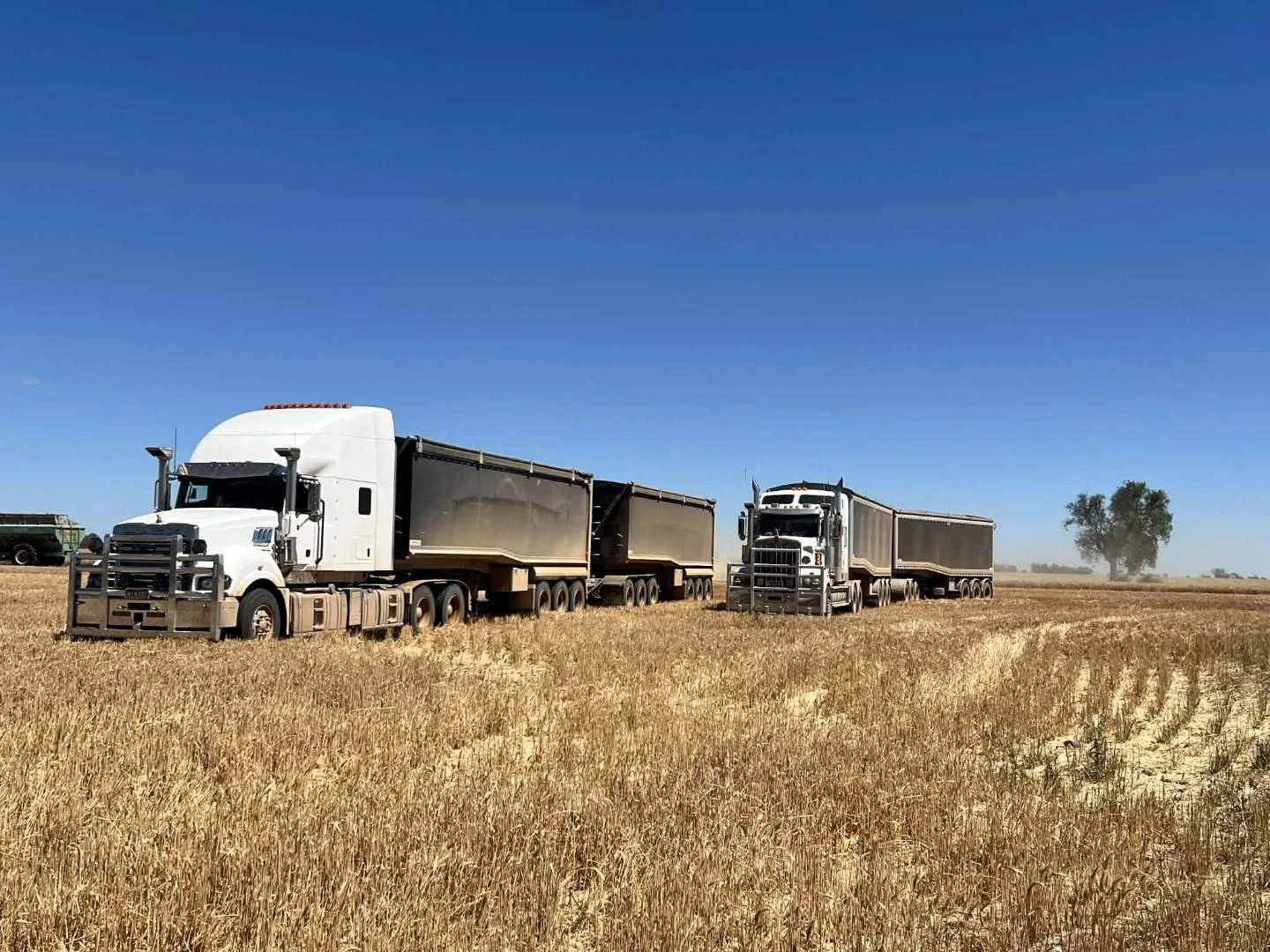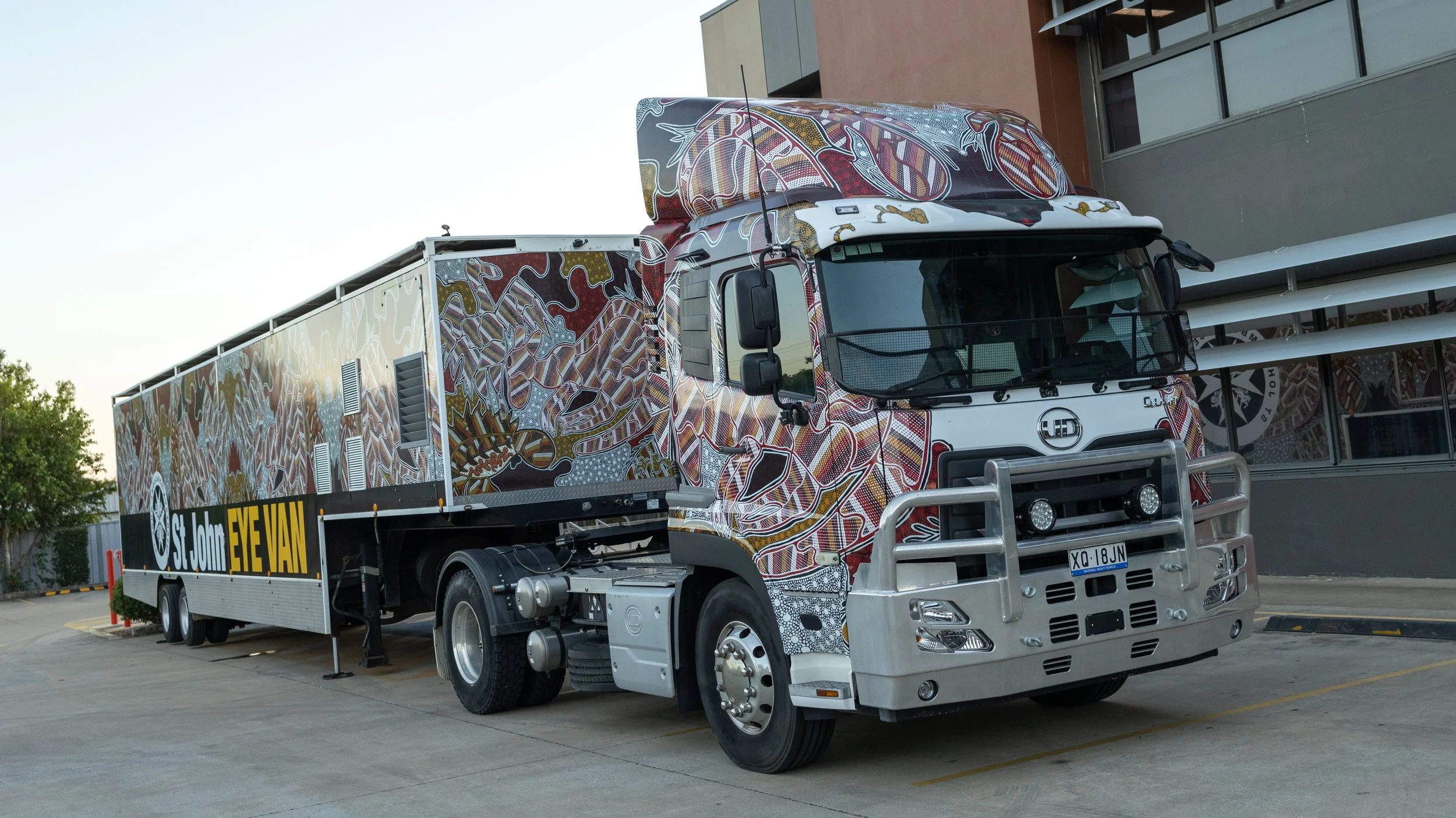Crates, Cattle & Kenny - The Gary Newman Story
“This ute came up beside me with three blokes aboard. One of them stuck his head out the window and yelled, “Hey mate! You’ve got a bloody sheep riding on ya mudguard between the trailers!”
“I looked in the mirror and there was. Looked in other mirror and there was another one. Shit!”
Gary Newman was born around livestock. Not as in living on a farm but on the back of trucks, namely Mercedes-Benz 1418’s.
“Dad (John Newman) had his own trucking business carting livestock,” reminisces Gary. “He had three single-drive 1418 Benz’s and single deck cattle crates, driving Swan Hill, Kerang, Echuca and Cohuna to the Newmarket Saleyards. I guess I was always destined to follow in his footsteps, although I’ve tried to get away from it numerous times.”
“I remember going to Newmarket with him when I was young. That was an eye-opener! Newmarket is now obsolete of course - it’s all built up with homes these days. But it was fascinating going to watch these guys working the stockyards on horseback in the middle of Melbourne. It was something you didn’t see.”
“Eventually dad sold out and bought an ex Philips Transport (Shepparton) 2024 V-8 cab-over Benz. He had that for a little while doing interstate work Melbourne to Adelaide, carting general freight. Interestingly, although Philips had sold the truck it didn’t stray far as dad subbed a lot for them.”
“A Road Commander followed – again ex Philips – but bought through Graham Thompson Motors in Shepp. That was eventually traded back to Graham Thompson for a Kenworth cab-over, again an ex Philips truck. Philips transport obviously looked after their gear.”
John eventually sold the Kenny and went to work for Nelson Silos, delivering their product to farms around the countryside. As if that wasn’t enough, he would work for O’Sullivans Transport – well known for livestock haulage - on the weekends.
As a young tacker, Gary would often hop into the truck with John.
“I remember one day going down through Black Forest, between Kyneton and Gisborne I think it was, when dad told me to lean out the window of the truck. He’s passing another truck and the bloke in it has big bottle which he handed to me. Dad said, ‘don’t drop it!’ It was a big bottle of King Brown and the old man is swigging on this all the way down.
“It was a different world back then. Dad worked all night and worked all day. He might’ve gotten four or five hours sleep if he was lucky and do it all again. His work ethic was second to none.
“I got a lot of my work ethic and driving lessons from dad. He’d put me in the driver’s seat of a livestock truck with an empty three-decker trailer behind and accompany me on a run. Then he’d put a load on the back and take me over the same route. It was to get a feel of the difference in the way the truck handles laden and empty.
“With the load on I’m driving around a bend and trying to steer and he says to back off a bit because the trailer was actually pushing me. It was a big difference from empty. It was a good learning curve in understanding the dynamics of truck driving and learning to drive accordingly.”
Leaving school, Gary worked for a spare parts company at Echuca for a bit before moving on to Lely Agricultural who sold farm machinery, where he gained his HC licence. That presented an opportunity to do some weekend driving.
“I rang Jim Morgan out at Colbinabbin, chasing up some driving work. He said he’d let me know if anything came up. The following weekend I was playing footy at Colbo so after the match I dropped in on him to introduce myself in person.
“That must have impressed him because the very next Friday night he rang with a job on the Saturday. “Can you do it?” You bet I could! Every weekend from then on I was behind the wheel of a single tipper carting grain and fertiliser.
“Tomato season came around and I decided to build up the bank balance by hopping into one of O’Sullivans trucks of a weekend (thanks dad for the family connection). I’d go to Boort on a Friday night, load the truck myself with a very makeshift forklift, go to Glengarry where I’d unload on the Saturday morning, do three or four local loads out of Colbo back into Glengarry, then either go back Saturday night to Boort or do local again on Sunday before again back to work on the Monday morning - absolutely knackered!
“$600 - $700 for two days work was pretty good money back then, even I was busting my arse to do it. That made me think what I could earn over five days if I went truck driving full-time. One thing leads to another and it was the beginning of a ‘revolving door’ with O’Sullivans that continues to this very day.
“My first full-time driving job was with Murray-Goulburn, picking up milk from the farms. That lasted around eight years until my first marriage finished and I headed to Queensland for a change of scenery. Picked up a gig with Eastern Well Services FIFO out of Toowoomba to the gas and oil fields driving Road Trains.
“Middle of November, 50° days, working in a sand pit, long pants, long-sleeved shirt, steel capped boots, crash helmet. I lasted around two weeks before I decided that Victoria wasn’t so bad after all and headed back.
“Back at Rochester I was looking for work and called Gavin O’Sullivan. “Remember me,” I said. “Or perhaps my dad, John?” He did remember me from that tomato season years before and said to give him 10 minutes. Sure enough he did and said to “come on down”. This was some 20 years ago.”
“I arrive and Gavin says, “Here’s a truck, here is a set of crates, go and convert it. You’re carting cattle for the night.” It took me back to dad’s old days. These days the crates are all four deckers so we can cart cattle and/or sheep. You throw decks over, put centre bars in to be able to cart sheep.
“That first night I jumped in the truck I went and saw dad and said I’m going to work for Gavin. He said, “Well take this, this and this. You’re going to need a prodder, here’s a raincoat, and you’re going to want gumboots and a pair of overalls. Take your own fridge with you, take a bit of food in it. Don’t forget your logbook”. Thanks dad, I’d forgotten most of this.”
“So I converted it to put the cattle on at Shepparton and went to Kyneton. I knew how to load properly having been taught by the old man – heavy stuff on the bottom light stuff on top. Draft out the Friesians because they are big and heavy and put the Jerseys on top. Beautiful, no worries. You have to think about things and put the light cattle up top - it’s just common sense.
“The cattle are all weighed at the farm or the Saleyards so the farmer or agent will know what’s what, but with experience – which takes a long time – you will know just by looking at them, something else I picked up from dad. Then you have to work out pen sizes dependent on the size of the cattle. Remember what I said earlier about dad taking me out in the truck empty and then loaded? It stuck with me; I’ve no desire to tip it going through a bend. It’s different world to carting general freight where someone else usually does the loading for you.”
“There are some people have come into the industry and had no real experience. They may have handled them in yards but carting them is totally different. You’re in a confined space. Your balls have to be pretty big to deal with some of the animals.
“You just have to know how to handle stock and to be able to read them. Each day is different. One day it might be goats, then pigs, bulls, cows or vealers. With the goats for example you try not to put the Billy’s up the top because they have a bit of a tendency to keep going forward and jumping out over the top. It’s something I’ve learnt along the way.
“So I’ve loaded at Echuca, down to Kyneton, unloaded there, come back to Shepparton and picked up more cattle which had to go back to Echuca and pick up still more. It’s now about 2 o’clock in the morning and I was buggered. At 6AM I’m on the go again.
“But I’m in a Kenworth 651 - one of the old ones with the bolt on 36 inch bunk. I’ve put my fridge between the seats with blocks underneath and a towel on top, and there’s my armrest. I’m a young bloke, I’m in a Kenworth. I’m halfway there!”
“The work could be fairly local or it could take you anywhere. I could end up north of Balranald carting out of farms up there. Or I might cart sheep over to Adelaide for the boat. We’d take them to the feedlots there where, they would feed them on pallets till they got used to it and then they would put them on the ship for export.
“One day they wanted me to do five or six loads carting from the feedlot to the boats. It was only 40 or 50 km each way, but it’s a hell of a lot of loading and unloading. You just long deck, meaning you leave your decks set up and run 100 in at a time. 100 in that deck 100 in the next and so forth. For that sort of run back then you didn’t worry about the weights and measures, not like it is now.”
Then Gary pulled the pin on trucking for 18 months and went to work for a building supply company at Maryborough – wanting to be home more often for the ‘family life’. The ‘family life’ didn’t work out so he drove for a bloke out of Avoca for a bit before getting back into livestock.
“I was carting pigs which I’d never done before. Half an hour up the road and these things are laying down on their side. I thought what’s going on here? I’d better stand them all up which I’d been taught to do with livestock. I rang the boss and I said all these pigs are laying on the side. He said, “Don’t worry, they’re sleeping. It means you’re going well.” Obviously I was given them a smooth ride.
“In 2010 I came back to O’Sullivans and stayed with them for three years before deciding to go and drive a school bus. Big Mistake! The ‘cattle’ on a school bus are a pain in the arse and you’re not allowed to use the cattle prodder on them. There was no money in it either.”
“So it was back to O’Sullivans yet again for six years. This time with Sam O’Sullivan, Gavin’s son. Gavin had started out way back when with an old Dodge or Bedford. He lost his license for a little while and Sam ended up having to drive him around and that’s how he fell into the business. Sam ended up buying a couple of his own trucks. He still works under the O’Sullivan banner but is separate from Gavin. He runs it as SJO Haulage.
“Then, I’m ashamed to admit that I lost my licence. Not in a truck I hasten to add. So all of a sudden I’m out of a job of course. I was living in Wagga at this stage so I worked for Complete Road Seal up there. I was the guy with the shovel. Six months of that then to Mackay, Queensland for another six months rust proofing underneath cars. I worked for Toll for a bit as a dockhand. I had no idea how hard that was, throwing parcels on a conveyor belt. Then I got a job at Hastings Deering, a CAT dealership up there, driving a forklift and picking parts. I guess I’ve been a jack of all trades - some of it by choice, some forced upon me.”
“I got sick of that, regained my license came back to Rochester and started back in one of Gavin O’Sullivan’s trucks yet again. Two months later Sam asks me to come work for him. He offered me the T909 which I’d driven for him when it was new – or a 509 which had been tipped over six months before and been rebuilt. I took the 509. Why? Simple – it had a 60” bunk and an Icepack air conditioner.
“This was August of last year. With 1.2 million clicks on the clock the Cummins E5 threw a hissy fit and had to be rebuilt. Then, 160,000 K’s later it didn’t sound too good. They cut open an oil filter and there was metal everywhere so back for a second rebuild. Bear in mind that what livestock trucks do is very demanding: Where we going what we cart, dirt tracks. Some of the roads I wouldn’t call roads.”
“In a year I might do 215,000KM. A lot of people would think that that was nothing but there’s also the loading and unloading. I might go to a saleyards and sit there for an hour or 3 waiting, then it takes an hour and a half to load. Then I have to wash it out. Washing out took me three hours last night. It’s essential to preserve your trailers and also you can’t roll up to a farmer’s place with some other bloke’s shit on the bottom of your trailers. You also don’t want to be covered in shit yourself when you’re inside flipping decks.”
Is loading cattle a dangerous job?
“Yes it is. The biggest thing is watching livestock; how it moves, how it thinks. Folks might think sheep would be easy, but not always. A couple of months ago loading sheep and this lamb came at me, hit me straight in the chest and knocked me over. Couldn’t do much about it.
“You are in a confined space when you’re penning up and so, yes it is dangerous. Climbing around the side of the trailers, well you can’t these days. You go to any abattoir they say no climbing on crates. Nothing over 2 metres unless you’ve got a safety harness on. It’s not worth it for good reason.”
How do you live with the smell?
“It’s just one of those things that’s part and parcel of the job. Do I get used to it? Yes and no. The sheep smell is probably not too bad. Cattle for a couple of days I can really smell it. Pigs you can smell straightaway. Not big on pigs. Goats are the same, they have a very distinctive smell. You become inured to it and of course you shower every night - or try to. Some days I just have to have a bird bath on the run, so I get out underneath the water tank and wash myself off.
“And that’s the biggest thing we find as livestock drivers is that the conditions in most cases aren’t up to scratch. There’s a sales yard at Kyneton where they built a shower and they think it’s great. But it’s pushbutton and lasts for two minutes which is nowhere enough time. There’s also a gap top and the bottom in a town as cold as Ballarat (cold!). He thinks its fine because that’s what campers do. We’re not campers. Why didn’t he ask the question?
“A lot of saleyards don’t ask truck drivers how to set up guards. I had a prime example at Ballarat the other day where all the gates swing off one side. For me, wanting a safe working environment, the gates should criss-cross each other – a lot easier and safer when working cattle.
They built a multi-million dollar saleyard at Ballarat. There’s undercover facilities for selling pens and agents but where they store the sheep before we pick them up is out in the weather on concrete. Where is a sense in that? It snows in Ballarat! But we’re only truckies, right?”
“At Euroa saleyard they have a truck wash. I’m going to get wet and I’m going to get cold but there are no shower facilities there at the moment because it costs them too much. They spend a fortune on the yards and nothing to look after us.
“Kyneton saleyard set up a truck wash and they put a roof over it. They went and measured a fridge van. Fridge vans are 4.3 metres tall and we’re 4.6 so we don’t fit! They put in pump facilities which aren’t up to scratch, so instead of an hour and a half to wash out, its two hours and they are charging $1.10 per minute to use their water. They might make an extra $30 out of it. Is it intentional? I don’t know. All we ask is that these folks speak to the people who know, and that’s us. This all sounds like a whinge and I don’t mean it to be. It’s just how it is. I’m sure the guys who stop at Gatton will sympathise….
“Like any truck job you’ll get some fun times. I was unloading at Brooklyn one day and I had to go to Cranbourne. I thought I’d closed the doors between the trailers properly. I get to the first set of lights and a bloke in a ute pulls up beside me and yells out that I’ve got a lamb on the mudguard between the trailers. I look in the mirror. Yep. Next thing I see another one!
“Mate,” I yell back. “Can you give me a hand to catch them? “Yeah no worries.”
“I pull up around the corner and shut the gates. The two lambs have headed off in opposite directions. Okay, we’ll get this one first. So the three blokes from the Ute help me get it cornered. One of them is built like a brick shit-house. “If it comes near you just clothes-line it,” I say.
“Hang on mate,” says the big feller. “Do they bite?”
“No sheep don’t bite mate, you’re right.”
“The bloody Sheep’s gone straight at him, he jumps out of its way and it crosses three lanes of traffic on Geelong Road into a house yard. I’ve chased it across the freeway cornered it and it comes at me. I’ve lifted it up and dumped it straight on its arse.”
“I put it in the back of this bloke’s ute and ask if he can take it back to the truck for me. He’s driven off and I think, that’s $200 worth of lamb. Have I just thrown two hundred buck’s worth of kebabs into some bloke’s ute? I get back to the truck and there he is, the champion!
“Now for the other one which had gone into a wrecker’s yard. I’d rung the cops before just to cover my backside because if a car has an accident with the sheep I’m done. So the cops turn up and we go to this yard. Eventually we find it right at the back. I’m dragging it over gearboxes and motors to get it out and one of the coppers offers to lend a hand. We’ve gone maybe five steps and he says, “F**k that’s heavy!”
“That’s all right says me, I’ll do it. Another 50 metres to the front gates of the yard and I’m pretty well done for. “How are we going to get this back to the truck (which is another 400 m),” says I.
“No worries,” says the other copper. “We’ll call a Divvy van.”
“The Divvy van turns up and we throw the sheep in the back and I say to the cops how am I going to get back to the truck?
“You’ll have to ride in the back with the sheep.”
“Your joking aren’t you?”
“Nope, no other room.”
So I’m sitting in the back of the Divvy van with the sheep, having a serious conversation with it and illustrating how unhappy I am.
“The lady cop open’s up the door. I should have been pretending to do up my pants as I got out - it would have looked so funny. The lady copper had a great sense of humour and would have cracked up. Eventually I get it into the crate and the lady cop asks what my license number is. I’m wondering if I’m being done for having an insecure load. “No, we just have to cover your arse and ours,” she said. They were great.”
Gary Newman loves his job. Loves being in the middle of nowhere. Loves the hospitality of the farmers – especially up north where he will often be invited to stay for a BBQ or dinner. He loves standing on the top deck and taking in the vista of his surrounds. His three working dogs, Nipper, Morgan and Ned keep him company when running empty and do the job when a load is aboard. We finish our conversation with Gary mentioning that he’s heading for Ivanhoe the next day to pick up a load.
“I’ll send you a photograph along the way and you’ll see why I love what I do,” he says.
This is that photograph. Yeah Gary, I think I now understand.
More Blog Posts You Will Love
More From In-depth
Got something to say? Say it here!
truckinwithkermie.com is for YOU and about YOU. We’d love to hear your stories. There are a number of ways to get in touch with us:
kermie@truckinwithkermie.com
(+61) 0418 139 415
